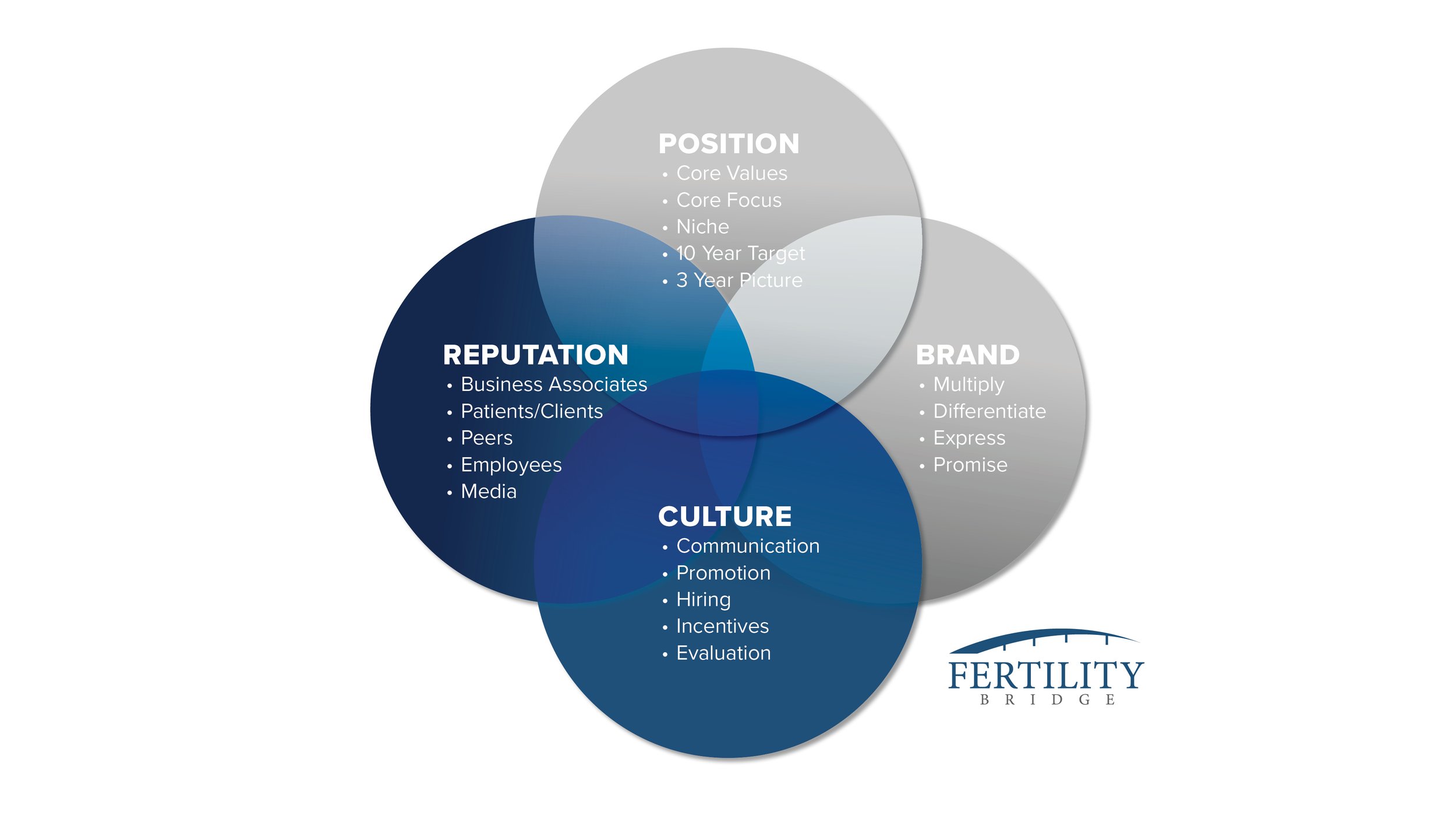“Our reputation speaks for itself,”
Does it?
Young, massively funded companies are entering the reproductive health space and developing widely recognizable brands to a population that had been generally unfamiliar with the field.
Established fertility companies often attempt to counter these branding advantages with their reputation.
Reputation is extremely valuable for all of us business owners in the reproductive health space, but especially for fertility specialists. Even when process complaints and negative outcomes make an REI’s rating less than five stars, you still have a proud reputation. You’ve dedicated your career--one which very few other people can do--to help people have families. Your reputation deserves respect.
Still, reproductive health companies that make little distinction between brand and reputation are at a competitive disadvantage.
Brand and reputation overlap. They can work with or against each other. But they are not the same.
In the absence of the intentional formula ‘reputation plus brand’, a fertility business suffers from the default equations of ‘reputation minus brand’ or ‘brand minus reputation’.
“Brand is about relevance and differentiation. Reputation is about legitimacy”
“A strong brand helps communicate that the company and its offerings are relevant and uniquely able to meet customer needs. A solid reputation is desirable because all businesses ultimately depend (either directly or indirectly) on the goodwill of the governments and communities in which they operate”. From 'Don’t Confuse Reputation With Brand' by Richard Ettenson and Jonathan Knowles
In the case of your fertility practice or reproductive health company, your reputation amounts to what is said about you by these five groups
Patients/clients
Peers
Employees
People you do business with
Media
Patients
On social media, on online review sites like Google and FertilityIQ, in patient support groups like RESOLVE and Fertility Matters. Through patient satisfaction feedback platforms like Press Gainey or Net Promoter Score.
Peers
If you are a physician this includes colleagues in the field, but also includes aspiring providers, referring providers, and competitors. At ASRM and other conferences. In private conversation
Employees:
On LinkedIn and sites like Glassdoor. At networking events and your own office.
People you do business with: Your vendors, expert advisors. How you treat them and pay them gets around, too.
Media:
The coverage that you do or don’t have from reporting outlets.
Reputation isn’t always fair. It is what it is. It doesn’t matter if one negative story in the press is a stain on your search results. It doesn’t matter if competitors drag your name through the mud, if a few former employees have an ax to grind, or if some former IVF patients take a negative outcome out on you. A sterling reputation is hard to come by.
A strong reputation is not necessarily equatable to a strong brand, either. And vise versa.
BRAND IS WHAT YOU SHOW OF YOURSELF
While reputation is what your five constituencies perceive and say about you, brand is what you give them to recognize you and associate with you (or not). Reputation is sometimes reactive. Brand is meant to be proactive.
Brand does at least four things that reputation does not do. It
Multiplies
Differentiates
Expresses, and
Promises
Multiplies
The simplest definition of brand is simply, a mark. No; logos, slogans, taglines, and ambassadors are not in and of themselves, a brand. Nowhere close. Still, these symbols allow companies to scale their message and perception to a magnitude and readiness that reputation cannot.
“Brand functions as a multiplier” -Mark Di Somma, Brand Strategy Insider.Differentiates
The purest form of differentiation is recognition. A successful brand allows each of the aforementioned groups to recognize an organization’s position and differentiate it from its competitors instantly. An artisan coffee shop may have a wonderful reputation, but you recall Starbucks’ mocha lattes, the way they name the sizes of their drinks, and how they write your name on the cup just by seeing their logo.Expresses
We’ve chosen to split the concept of brand identification into the two concepts of differentiation and expression because differentiation allows consumers to identify you out of a crowd, while expression allows them to use you as part of how they identify themselves.
There is an abundance of research, including this study from Elsevier, that shows how “consumers seek new ways in which they can express their personal identity through brands”. The more our field serves and works with newer generations, the more they use brands to express themselves.
“The core of Gen Z is the idea of manifesting individual identity. Consumption therefore becomes a means of self-expression.” - (From McKinsey & Company, ‘True Gen’: Generation Z and its implications for companies’ byTracy Francis and Fernanda HoefelPromises
Reputation is the judgment of your promise. Brand is the promise. Patients and clients set their own expectations in the absence, and sometimes in spite, of a clear promise. The more strongly your brand reinforces your promise, the more you are able to impact the measure by which you are judged.
REPUTATION PLUS BRAND
When fertility companies fail to distinguish the difference between brand and reputation, they are at a competitive disadvantage because of how reputation and brand bolster or undermine one another.
Reputation and brand overlap because they are both born of positioning and culture, but they are not equally synonymous.
In the absence of the intentional formula ‘reputation plus brand’, fertility business owners are left with the results of ‘reputation minus brand’ or ‘brand minus reputation’.
Consider the four advantages that a robust brand is meant to secure for your company. The last two, expression and promise, are particular vulnerabilities for reproductive health companies.
If you would like to further explore the brand and reputation potential of your fertility business, we address that in our Goal and Competitive Diagnostic.



